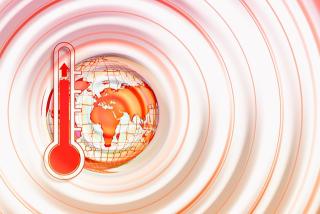
We hear in the news that if the planet’s global average temperature increases by more than one degree within a certain timeframe, then the consequences will be harsh. What does one degree of increased average global temperature really mean? In New England, our daily temperature can change at least 20 degrees (Fahrenheit) between night and day, so how could one degree possibly make a difference? How might such changes affect each of us, or our relatives and friends in other parts of the world?
-
Math teachers interested in incorporating the topic of climate change into their classes
- Science teachers interested in incorporating math into their classes
This professional development activity/course is designed for:
In this 2.5-hour facilitated session, explore and discuss tools, strategies, and resources for teaching about global climate change. The session will focus on the units of measurement for temperature, the concept of averages (mean) for finding average temperatures, and the instructional strategy of slow-reveal graphs for understanding graphs of climate data and projections.
You will leave with a set of resources, ready for teaching and making further connections.
-
Informally reason about temperature scales and average global temperature
- Facilitate a slow-reveal graph related to climate change
- Explore the related resources
Upon completion of this professional development activity/course, you will be able to:
United States


